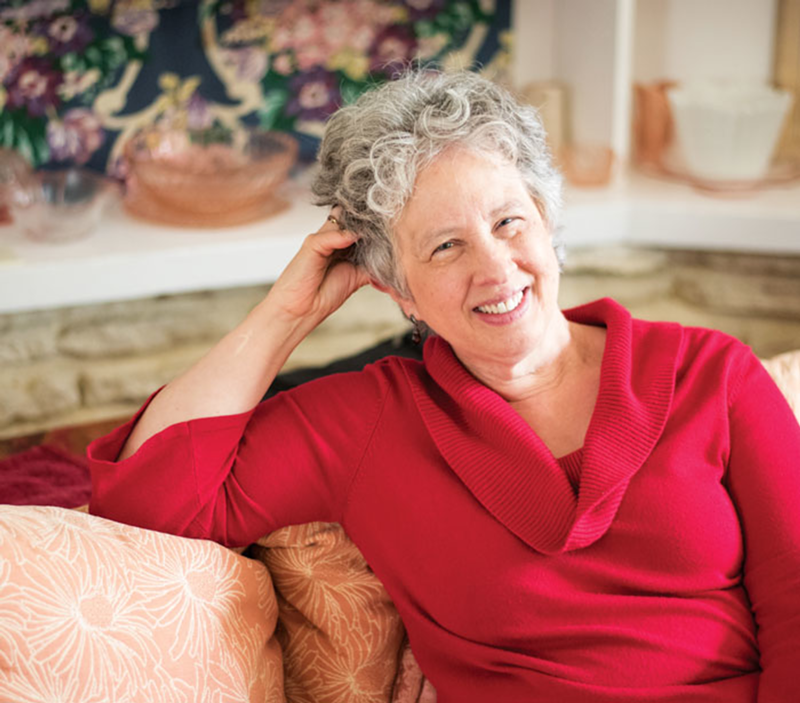
O
n the ides of April, despite a forgivingly warm day, it seemed that the entirety of Cincinnati’s poetry scene cloistered itself in the Mercantile Library to witness the inauguration of Cincinnati’s first poet laureate, Pauletta Hansel.
It went how you would expect, albeit with a few surprises — at one point a bird dove into a window pane like some strange omen, and Hansel concluded the coronation with a bold piece of Appalachian Hip Hop that belied her gentle demeanor.
Although being the city’s poet laureate is defined by a public role — expect community outreach projects and public poetry campaigns — Hansel’s poems are deeply personal, rooted in her Appalachian heritage. She was born in southeastern Kentucky and wrote her first book of poetry six years after that, before she could spell. At around age 12, she knew she wanted to dedicate her life to the art (“If a girl is meant to be / a poet, sixth grade is what / gets her there,” she writes in one poem).
It was a simple decision. “It was something I needed to do,” Hansel says. She didn’t read poetry, but she heard it on the radio: Hansel traces her love of poetry to the ’70s pantheon of singer/songwriters like Leonard Cohen and Joni Mitchell, who inspired her to express herself through words.A high school dropout who later went on to earn an MFA in poetry, Hansel moved to Cincinnati in 1979 and never found a reason to leave. The lofty title of poet laureate lands on a resume that’s already impressive. A fixture of Cincinnati’s bard culture, she’s been published extensively in literary magazines across the Midwest, served as writer-in-residence for multiple organizations and leads writing workshops across the region.
The poems in her fifth and latest book, Tangle, are serrated with a nostalgic grief and sink into many of life’s various corners: death, friendship, family. But the heavy thread carried throughout the entire book is the idea of home. The book is a lyrical tour not through Cincinnati, but through the ancestry and memories that have grounded a sense of place in the poet.
“Either the presence or absence of home is something most people can relate to,” Hansel says in a metered voice. “It’s universal in its specificity.”
This theme of home is explored uniquely in her poem “Body,” which confesses a physical discomfort. “The first thought / I remember is the grief / of waking to find myself / alone inside my body.” Lines like these don’t lend themselves to being plastered in streetcars or other public spaces, but as Hansel makes clear, her two-year tenure as poet laureate will be devoted not to promoting her own writing, but to giving everyone — from poets to the illiterate — the opportunity to contribute poetry to citywide projects.
But what does a laureate actually do? The answer depends on the poet. Much like the national laureateship, there are few requirements for the position. Instead, the city allows the honored poet to design his or her own agenda (the few stipulations include a developed strategy to advocate for poetry and a vow to not sue the city). It’s not a paid position, but upon winning, Hansel received a “very, very modest” honorarium.Hansel’s own itinerary is ambitious. One proposed project would architect a collaborative poem that grafts multiple lines by different writers in an effort to embody a community’s spirit. Another plan is to resurrect a neighborhood poet laureate program she remembers from the ’80s that would recognize poets in each of the city’s 52 neighborhoods.
As poet laureateships bloom across the U.S., it might seem like the achievement is being watered down a bit. Does every city deserve a poet laureate, or does the proliferation of the position signal that cities are desperate to prove that capital-C Culture exists here? Hansel is adamant that more people versifying is better for the world, and she is enthusiastic about connecting people to literary resources in Cincinnati.
“I wouldn’t say that I’m just going to get people excited about writing poetry,” Hansel says. “It’s more giving people permission and encouragement to write about themselves, and to do that within the framework of poetry.
Because there is no local precedent, Hansel can’t look for inspiration in past Cincinnati laureates, although there are plenty at the national level. She says she’s inspired by U.S. laureates like Billy Collins, who implemented programs in public schools to acquaint teenagers with the values of poetry. Hansel also admires the work of the other Cincinnati laureate finalists, Mark Flanigan and Scott Holzman.
National laureates like Rita Dove and Natasha Trethewey leveraged the position to spread awareness about social issues, but Hansel admits that although she comes from a strong tradition of poetry and creative writing being used as devices for social justice, her own poetry takes a different approach.“I don’t use poetry as a hammer,” she says. “I use poetry as a mirror — for myself and for others. Poetry has to be based in a particular body, and a body is based in a particular location. I think that people respond to poetry that is personal and specific — poetry that tells a story.”
Still, her inauguration at the Mercantile saw her reading poems that touched on local politics, from gentrification in Over-the-Rhine to coal mining in eastern Kentucky. The audience, rapt, weighed each syllable as Hansel read until the final poem ended. The standing ovation that followed seemed to suggest that the city would be in capable hands, and words. ©

